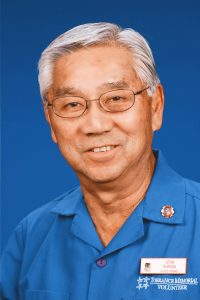
Scott Tanaka
In celebration of National Volunteer Month, I want to honor my grandfather, Stanley Ikuo Kuroda. After working as an engineer at TRW for 25 years, he went on to become a volunteer at Torrance Memorial Medical Center.
Over the course of 20 years, he contributed 11,537 hours of service to the hospital. In 2004, he was elected president of the volunteers, a role that made him very proud. Other roles included helping with the bookkeeping in the hospital’s gift shop and, most recently, he worked with Rev. James Kim, one of the hospital’s chaplains.
In addition to volunteering at the hospital, he was active at our local church, Gardena Valley Baptist Church, and with JEMS (Japanese American Evangelical Society). He also helped do the bookkeeping for a cymbidium club in the area, as well as the Monterey Park Seniors travel group. He loved his orchids, traveling and photography. Whether it was volunteering at the hospital or with his travel group, you could always find him with his camera in hand.

Stanley Kuroda
I believe all his years of volunteering helped keep his mind and body active and healthy. Sadly, my grandfather passed away in June 2020 due to Covid-19, but his legacy of service lives on.
I mentioned how my grandfather benefited from his volunteerism and wanted to share a few more examples of how you can benefit from volunteering from AARP’s Create the Good. When you volunteer, you have the opportunity to improve your community and our world. And in addition to making a difference for your fellow human beings, there are multiple benefits you can receive in return.
Strengthen Relationships and Make New Friends
Volunteering is one of the best ways to meet new people, make new friends and grow relationships with the friends you already have. With each project, you’re united in a common goal, sharing the same passion to help others in your community. Creating the Good is contagious. As you meet more people and invite friends to join in, they, in turn, will likely do the same. And working together in a low-stress, flexible environment is the perfect recipe for new volunteer ideas.
Boost Your Health
Volunteering is proven to help reduce depression and stress levels, boost your self-confidence and even help you live longer. In fact, a study from Carnegie Mellon University showed that adults over age 50 who volunteered regularly were less likely to develop high blood pressure than nonvolunteers. But health benefits aside, as nationalservice.gov says, feelings of pride, satisfaction and accomplishment are worthwhile reasons to serve.
Learn more about the health benefits of volunteering at https://createthegood.aarp.org/volunteer-ideas/health-benefits.html.
Have Fun
Perhaps the best part of volunteering is simply the joy you feel knowing you’re helping others. As a volunteer, you’re seldom tied down to a single task, and your time commitment can be as flexible as your schedule permits. If you’re not getting a sense of fulfillment in your volunteer role, you can simply move on and try something new.
Volunteer Opportunities
Volunteers are core to everything we do at AARP and help us carry out our motto of “To serve, not to be served,” as articulated by our founder, Dr. Ethel Percy Andrus. You can sign up and learn more about becoming an AARP Volunteer at https://www.aarp.org/volunteer/programs/. There are several opportunities to help with our efforts at the national level and at the local level through our state offices.
You can also visit AARP’s Create the Good (https://createthegood.aarp.org/), which connects you with volunteer opportunities to share your life experiences, skills and passions in your community. AARP’s Creates the Good offers volunteer opportunities within AARP and with other organizations. There are virtual opportunities, too.
These are just a few ways you can volunteer, but there are countless others, both formal and informal. I recently stepped down from the board of the JACL Washington, D.C., chapter, and during the pandemic, we called our older members to see if there was anything we could do to help them. Most of them let us know they were fine, but that they really appreciated us checking in on them. Sometimes, a simple phone call, letting someone know that you are there for them, goes a long way.
Scott Tanaka is a member of the JACL Washington, D.C., chapter and is a policy, research and international affairs adviser at AARP.



